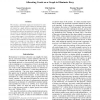Free Online Productivity Tools
i2Speak
i2Symbol
i2OCR
iTex2Img
iWeb2Print
iWeb2Shot
i2Type
iPdf2Split
iPdf2Merge
i2Bopomofo
i2Arabic
i2Style
i2Image
i2PDF
iLatex2Rtf
Sci2ools
117
click to vote
AAAI
2007
2007
Allocating Goods on a Graph to Eliminate Envy
We introduce a distributed negotiation framework for multiagent resource allocation where interactions between agents are limited by a graph defining a negotiation topology. A group of agents may only contract a deal if that group is fully connected according to the negotiation topology. An important criterion for assessing the quality of an allocation of resources, in terms of fairness, is envy-freeness: an agent is said to envy another agent if it would prefer to swap places with that other agent. We analyse under what circumstances a sequence of deals respecting the negotiation topology may be expected to converge to a state where no agent envies any of the agents it is directly connected to. We also analyse the computational complexity of a related decision problem, namely the problem of checking whether a given negotiation state admits any deal that would both be beneficial to every agent involved and reduce envy in the agent society.
AAAI 2007 | Distributed Negotiation Framework | Intelligent Agents | Multiagent Resource Allocation | Negotiation Topology |
| Added | 02 Oct 2010 |
| Updated | 02 Oct 2010 |
| Type | Conference |
| Year | 2007 |
| Where | AAAI |
| Authors | Yann Chevaleyre, Ulrich Endriss, Nicolas Maudet |
Comments (0)

